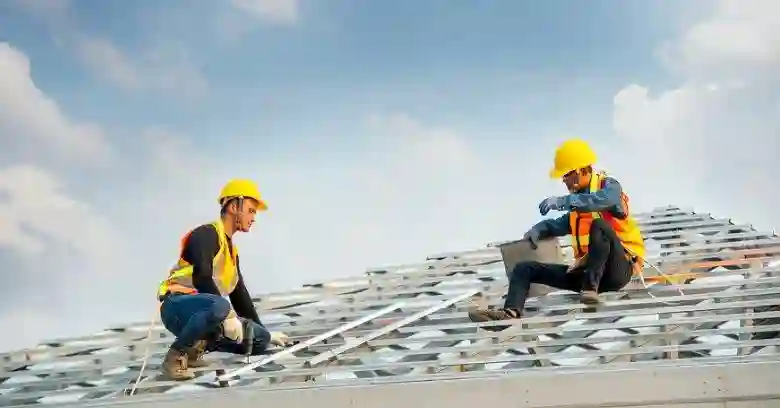The quest for renewable energy sources and eco-friendly solutions is driving innovation in the construction industry. One such innovation that’s gaining momentum is solar roofing. Solar roofing, also known as solar shingles or solar tiles, combines the benefits of traditional roofing materials with the ability to harness solar energy. It not only protects your home from the elements but also generates electricity, making it an eco-conscious choice for homeowners. In this article, we’ll explore the concept of solar roofing, the role of roofing contractors in its installation, and the advantages it offers to both homeowners and the environment.
Understanding Solar Roofing
Solar roofing is a revolutionary approach to energy generation and home improvement. Instead of installing traditional solar panels on top of your roof, solar roofing integrates solar cells directly into the roofing material itself. This seamless blend of functionality and aesthetics offers numerous advantages:
- Efficiency: Solar roofing is highly efficient as it converts sunlight into electricity with minimal energy loss. The cells are strategically placed to capture the most sunlight throughout the day.
- Aesthetic Appeal: Solar roofing is designed to resemble traditional roofing materials like asphalt shingles or tiles. This ensures that the solar panels blend seamlessly with your home’s architectural style.
- Durability: Solar roofing materials are built to withstand the elements, including harsh weather conditions like rain, wind, and snow. They are designed to have a long lifespan, often comparable to or exceeding that of traditional roofing materials.
- Energy Savings: Solar roofing generates electricity that can be used to power your home. Excess energy can be stored in batteries or fed back into the grid, potentially leading to energy savings and even income from selling surplus power.
- Environmental Benefits: By generating clean, renewable energy from the sun, solar roofing helps reduce your carbon footprint and reliance on fossil fuels, contributing to a greener and more sustainable future.
The Role of Roofing Contractors in Solar Roofing
Installing solar roofing requires specialized knowledge and expertise, which is where roofing contractors come in. Here’s how roofing contractors play a crucial role in the process:
- Site Assessment: Roofing contractors evaluate your roof’s condition, orientation, and suitability for solar roofing. They determine if any repairs or modifications are needed before installation.
- Material Selection: Contractors help you select the appropriate solar roofing material, style, and color that align with your home’s design and energy needs.
- Installation Expertise: Experienced roofing contractors have the skills to install solar roofing securely, ensuring that it integrates seamlessly with your existing roofing system. Proper installation is critical to preventing leaks and maintaining the roof’s durability.
- Electrical Connection: Roofing contractors work with electricians to connect the solar roofing system to your home’s electrical system. They ensure that the wiring is safe and compliant with local regulations.
- Permitting and Regulations: Contractors assist with obtaining the necessary permits and approvals for solar roofing installation, ensuring that your project complies with local building codes and regulations.
- Maintenance and Repairs: Solar roofing requires regular maintenance to ensure optimal performance. Roofing contractors can provide maintenance services and address any issues promptly.
Advantages of Solar Roofing
- Clean Energy Generation: Solar roofing harnesses the power of the sun to generate electricity, reducing your reliance on non-renewable energy sources and lowering your carbon footprint.
- Energy Savings: Solar roofing can significantly reduce your electricity bills by generating free energy from the sun. Any excess energy can be stored or sold back to the grid, potentially earning you money.
- Increased Property Value: Solar roofing can enhance the resale value of your home. It’s an attractive feature for eco-conscious buyers and can distinguish your property in the real estate market.
- Long-Term Investment: Solar roofing systems typically have a lifespan of 20 to 30 years or more. They provide a long-term return on investment through energy savings and potential incentives.
- Environmental Impact: By generating clean energy, solar roofing contributes to reducing air pollution and greenhouse gas emissions, helping combat climate change.
- Grid Resilience: Solar roofing can provide energy independence and resilience during power outages, as long as you have battery storage capabilities.
Considerations for Solar Roofing
Before investing in solar roofing, here are some important considerations:
- Cost: While solar roofing can provide long-term savings, the initial installation cost can be substantial. It’s essential to calculate the return on investment over the system’s lifespan.
- Roof Condition: Your existing roof should be in good condition before installing solar roofing. Any necessary repairs or replacements should be addressed beforehand to prevent future issues.
- Orientation and Shading: The orientation of your roof and the presence of shading from trees or nearby buildings can affect the efficiency of your solar roofing system. Contractors can help assess these factors.
- Local Regulations: Solar roofing installation may be subject to local regulations and building codes. Ensure that you understand the permitting process and compliance requirements in your area.
- Warranty and Maintenance: Inquire about warranties for both the roofing material and the solar panels. Additionally, consider maintenance costs and requirements.
Conclusion
Solar roofing represents a transformative approach to roofing that combines functionality, aesthetics, and sustainability. It allows homeowners to harness the power of the sun to generate clean, renewable energy while protecting their homes from the elements. Roofing contractors play a vital role in the successful installation and integration of solar roofing systems, ensuring that they provide both energy efficiency and durability. By investing in solar roofing, homeowners can not only reduce their energy bills but also contribute to a more sustainable and eco-friendly future.


